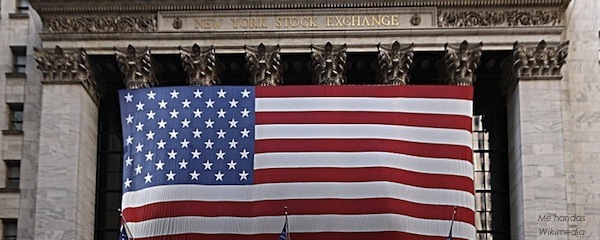Former Massachusetts Governor Deval Patrick seems to have decisively ended speculation he had national aspirations in the Democratic Party after announcing he will be going to work for the job-slashing firm Mitt Romney founded to help rich people park their money in “good causes”:
Deval Patrick is joining the Boston investment giant Bain Capital, where the former governor will start a new line of business, directing investments in companies that produce profits but also have a positive impact on social problems. […] Patrick will help give Bain its first foothold in the growing field of “social impact” investing, tackling social problems such as hunger and climate change with for-profit investments.
[…]
During the 2012 presidential campaign, when stumping for Barack Obama against Romney, Patrick declined to join Democrats who vilified Bain and Romney’s work for the firm. On MSNBC’s “Morning Joe,” Patrick called Bain “a perfectly fine company.”
[…]
For Bain Capital, the Patrick hiring goes beyond the common practice of giving a politician a desk and a rainmaker’s role between elections. It is a way for a firm known for hard-core business deals to provide clients such as pension funds and wealthy individuals with a social outlet for their money.

Former Massachusetts Gov. Deval Patrick served from 2007 to 2015. (Photo by Scott LaPierre)
This role sounds innocuous, or even positive, and perhaps it will be. But Bain in particular has a fairly nasty reputation, and the general field of “social impact investing” can be fairly shady. Instead of just using money to fix long-term problems, everything becomes a shorter-term profit-seeking investment. Many of these private sector investments aim to replace government functions (or even profit off government) and treat all the problems in profit/loss terms. Whereas a one-way donor or a government program is ostensibly acting in the public interest, all social impact investments are made in the primary interest of the shareholders or company stake-owners. Some of the money that could be re-invested into getting an even bigger impact is instead needlessly siphoned out to create a profit margin.
Moreover, I am specifically concerned because of the recent, very sketchy “social impact” investments of Goldman Sachs in the Massachusetts correctional system, when Gov. Deval Patrick was still in office, which could foreshadow the type of investments he would introduce into the Bain portfolios. Such investments are far more concrete (and financially less abstract or long-term) than amorphous goals like “hunger” and “climate change.” I wrote about them in May 2014:
Recently, in some states, Goldman Sachs has been issuing “social impact bonds,” a new financial instrument that purports to help cure social ills with Wall Street’s “help.”
In this case, they’re loaning $9 million to the state of Massachusetts to help support a Boston organization that tries to help young offenders from bouncing back into prison. (Reducing young recidivism is a good social goal, obviously, and would have a ripple effect on crime prevention.)
If the effort reduces the number of days past inmate spend back in prison — which would save the state money — the savings would go back to Goldman Sachs, up to a million dollars. If the effort really pays off (above and beyond the bond repayment terms), then the state would get to keep the money. Of course, if the effort doesn’t hit the minimum targets needed to generate enough savings, Goldman Sachs would still get interest payments on the bond, but would lose the principal loan ($9 million or however much of it couldn’t be repaid due to insufficient savings).
As private investments in the prison industry go, it’s not the worst thing in the world. At least the profit incentive is toward rehabilitation rather than toward further imprisonment in the way privatized prisons are. But the question is why is it even necessary to involve the private sector middleman in the first place?
The state could pay for the upfront cost of the program through tax revenues (if it were willing to raise taxes, of course), instead of taking a loan, it would keep all the money and not end up paying Wall Street no matter how things turn out. That money could be reinvested into expanding the successful efforts even more, thus benefiting all taxpayers.
In my opinion, the job of corrections and the rehabilitation of young offenders is part of the role of government. The private sector is free to help, but it should be an add-on to the process, not a redundant profit diversion mechanism in the middle.
Another problem is the issue of emphasizing data-driven decision-making in government. The profit motive strengthens this trend much faster, even though government is often meant to be performing roles that could not be profitably well executed by the private sector and remain profitable. The data-driven policymaking favored by such approaches presents a false objectivity in place of really subjective questions: Read more







